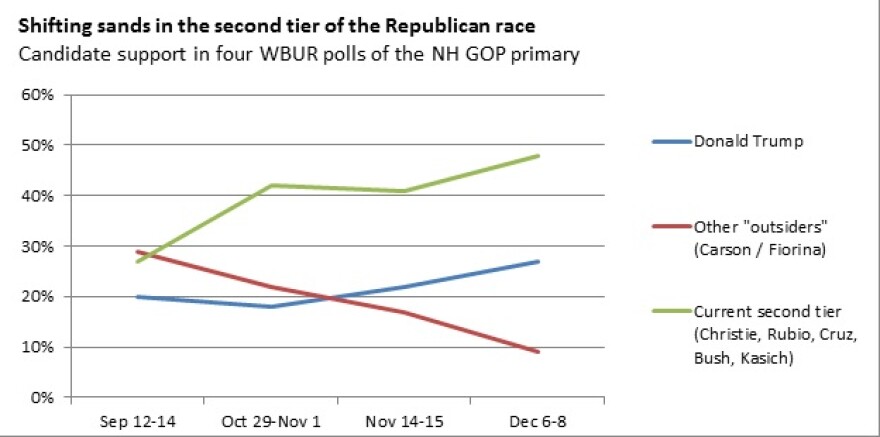The field is set for tomorrow’s GOP presidential debate, with eight candidates set to take the stage for the evening’s main event. The lineup hasn't changed much from the last debate, the main difference being the addition of Chris Christie thanks to his improving poll numbers in New Hampshire.
But the stability onstage belies a shift in the structure of the race, particularly in New Hampshire. After a summer when political neophytes pulled the lion’s share of support, the last few weeks of New Hampshire polling have seen a resurgence by “insider” candidates.
Yes, Donald Trump, the ultimate outsider, maintains his lead (in New Hampshire and elsewhere). But Ben Carson and Carly Fiorina – the two other GOP candidates with no experience in political office -- have faded considerably over the last few months. Voters still like both of them, but they have steadily slipped from contention. In mid-September, Carson and Fiorina accounted for 29 percent of the vote in New Hampshire. Today, they pull just 9 percent between them.

As Fiorina and Carson slide, a pack of current and former governors and senators has taken their place behind Trump. It’s unclear whether any of them will become the clear alternative to Trump the establishment is seeking. But they’re all trying. Christie had his strongest showing yet in last week’s WBUR poll, edging his way into second place. But he is just 1 point ahead of Ted Cruz and two above Marco Rubio. John Kasich and Jeb Bush are also in the mix.
This second tier is so tightly bunched that it’s hard to give one candidate an edge. But one thing is clear: the main alternatives to Donald Trump are no longer other outsiders. It’s the candidates with at least some connection to the GOP establishment who are creeping up on Trump.
With so little daylight among the second tier, Tuesday’s GOP debate will be crucial in determining whether any candidate will become the clear “best of the rest”. Trump is still holding onto his lead, but there are plenty of voters not in his column. If another candidate could make steps toward unifying the non-Trump vote to any appreciable extent, the gap could close in a hurry.
Making this more possible is the fact that much of the non-Trump vote appears available to any of the second-tier candidates. A look at voters’ second choices – whom they would support if their preferred candidate were to drop out – reveals these affinities. If Kasich were to drop out, for instance, his voters would most likely move to Bush or Christie. Current Christie supporters would look next at Bush and Rubio.
The only candidate likely to send a big chunk of voters to Trump would be Ted Cruz, who is certainly the outlier of the second-tier group based on ideology (especially in New Hampshire) and his frayed relationship with the GOP establishment. The rest of the bunch seem likely to bolster one another w if any dropped out, given their ideological proximity, and their current supporters’ second choices.
Breaking away from the second tier is key because of the increasing likelihood that the GOP contest will be a drawn-out affair. GOP rules that mandate that the first states award their delegates proportionally will prevent a frontrunner from amassing a prohibitive lead early on. This means the pack can keep Trump within sight, even if he wins early states. And if candidates start to drop out, more of their support is likely to go to another “insider” than to Trump. Even Carson’s voters are more likely to go to Rubio or Cruz than to Trump.
The RNC rules could also extend the primary campaign by giving trailing candidates an incentive to stay in the race, picking up a few delegates just for being in the mix. Indeed, the rules may yet leave the GOP with a contested convention, an eventuality for which party leaders are now preparing. It’s ironic that a race with a long-time and dominant frontrunner may yet produce a messy, drawn-out and contested outcome. But with second-tier candidates aligned to capture support from each other as they drop out, that could be what happens.
Surely this won’t all be resolved at Tuesday night’s debate. But with time beginning to run short, the candidates running behind will be looking to make their move.







